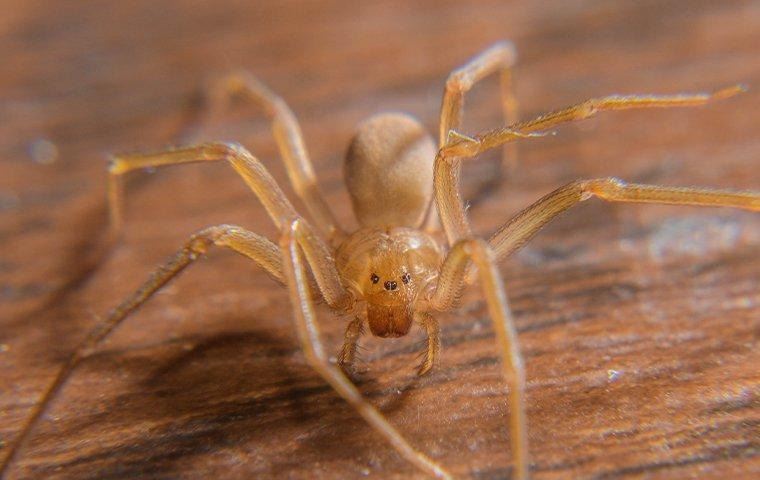
How To Keep Spiders Out Of Your Mooresville Home
It can be quite startling to encounter a spider in your home. Have you ever found yourself looking at a big, hairy spider and asking yourself, "How on earth did that thing get in?" Well, we're going to help you with this mystery today. We're going to talk about the pathways and conducive conditions that lead to spider sightings inside Mooresville homes, and we'll offer up some tips that will help to keep spiders out.

What You're Up Against
We can place spiders into two categories: Common spiders and occasional spiders. Common house spiders are spiders that have no trouble getting into your home and surviving inside your wall and floor voids. Occasional spiders are spiders that do not survive well in your home. If they get inside, they aren't likely to stay for long.
Most common spiders are a low threat. Their bites (if they're able to bite humans) are mild and will only produce a small red bump. There is only one common spider, the brown recluse spider, where this is a concern.
Most occasional spiders are a medium threat. Their bites can feel like the sting of a bee. In this group, we have the black widow spider. Its bite can present a medical threat—though this is rare.
Ground Spider Entries
We mentioned the brown recluse spider and the black widow spider not only because they can present a health risk, but also because they get into Mooresville homes in a similar way. These are ground spiders that prefer to dwell near the ground and feed on larger insects and small animals, such as mice. Therefore, we consider the following tips to be of greatest importance. Here are ways you can keep ground spiders out.
- Inspect your foundation walls. If you have cracks or gaps, these will be exploited by ground spiders. Pay close attention around your utilities. You can seal some cracks with a foundation repair kit. Larger openings may need to be filled in with expansion foam or caulking material.
- Inspect your exterior doors. There are a surprising number of ways a ground spider can get past your doors. If you see gaps or holes, seal them. Replace weatherstripping and door sweeps. Repair screens. Realign your doors to create a good seal if necessary. Apply caulking around the outside edges of your door frames, if there are gaps. Fill in holes created by wood-destroying pests, like mice. This is particularly important as mice are a food source for black widows and brown recluse spiders.
- If your home has a crawl space underneath and you do not have it encapsulated, we strongly recommend you have this done. It is nearly impossible to keep ground spiders out of this space, and once they get in, they likely will find ways to get up into your home through pathways created by carpenter ants, termites, carpenter bees, rodents, wood boring beetles, or other wood-damaging pests.
Fly-Catching Spiders
While black widows may catch some flies in their webs and eat them, they don't really belong to this group. Fly catchers are spiders that create webs in high places and snag a wide variety of flying insects from gnats to moths. They're also the spiders that make webs in odd places, such as between your window screen and your exterior windows. This is because they eat the flies that try to get into your home the same way these spiders got in. Here are some tips for fly-catching spiders:
- Inspect your exterior window and door screens. Repair holes—even tiny holes. It doesn't take much of a hole to let certain spiders inside, such as the American house spider. Also, check your screen frames. If there are any gaps, you should seal them.
- Inspect your vents. If you have any unprotected vents, apply screen material to keep spiders out.
- Inspect your roof and roofline, or hire someone to do this. These spiders can get into your home through gaps in your roofline, soffits, fascia, and roof penetrations.
Conducive Conditions
If you have fewer spiders near your home, you'll have fewer spiders climbing on your exterior walls and finding ways into your home. One way to get control of spiders is to reduce attractants such as food sources, water, and harborage options.
- Keep garbage in covered containers.
- Address conditions that create standing water.
- Move objects away from your home, particularly wood piles.
- Move leaf piles, leaf litter, sticks and other organic debris away from your home.
How A Professional Can Help
When you invest in year-round pest control, a licensed pest professional can provide you with effective spider control. A professional will treat your exterior to reduce insects that are a food source for spiders, provide general pest maintenance, seal entry points, and remove spider webs—which can house egg sacs containing hundreds of eggs. All of these work together to make your home a spider-free environment.
If you'd like to learn about year-round pest control for your Mooresville home, we'd love to talk with you. Reach out to us anytime. We're here to help!


Customer Reviews
-
“Lake Norman pest control does a wonderful job all around and even explained the safety concerns I had of the products for my new baby and dog.”- Lauren G.
-
“Lake Norman Pest Control has always been consistent with their service quality and more than fair with pricing.”- Michael C.
-
“He called me after the appointment and gave me a summary of the service and he made some additional recommendations.”- Leslie Z.
-
Jake promptly arrived and asked what issues we were having and quickly began applying treatment. He was professional and thorough. Very pleased with the service today.- Lisa C.
-
“Jake promptly arrived and asked what issues we were having and quickly began applying treatment.”- Lisa C.
-
“Lake Norman always does a great job in communicating and shows up at their committed times.”- Mike C.
-
“Michael has beHe and every representative we’ve worked with from this company have been very kind and good at listening to our needs. en super helpful! He's prompt, thorough, and responsive to all of our questions.”- Kimberly G.
-
“Our technician, Jake, has been very helpful. He has been on time and responsive to all my questions.”- Laurence P.


Why Choose Lake Norman Home Services?
-
Give A CrapDelight others by owning your role and saying yes. Take pride in how you appear & act & every other detail of the job. Be on time, attentive, & enthusiastic. Act as if the buck stops with you on every aspect of the job.
-
Chase PerfectionChase Perfection, knowing full well we will not reach it, but along the way we will catch excellence. Have a sense of urgency; Go-Forth Time - right now might be the only time you have to get it right.
-
Dig Deeper
Be an action-oriented professional that makes decisions based on evidence rather than stories & assumptions. Stay curious. Data can speak for itself.
Understand the cause of the fire rather than rushing to extinguish it.
-
Fight For SimplicityKeep it simple & consistent. Focus on how things should be done every time.
-
Face It, Fix ItConfront challenges directly and address issues head-on. A bias for action and powerful conversations drive our progress. It’s about getting it right rather than being right.
-
Grow!Growth is our purpose. Growing as people & growing our business.